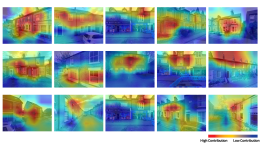A Cambridge developed AI model to meet net-Zero targets and advance Social Equity
2 November 2023
Researchers from the Department of Architecture at the University of Cambridge have developed a model to identify Hard-to-Decarbonize houses (HtD) with public data and the application of deep learning. By training AI to read and develop a framework from data-driven methodology, doctoral researcher Maoran Sun and his supervisor Dr. Ronita Bardhan, from the Sustainable Design Group, created a new model that will help to identify HtD across cities in the UK and globally and to guide local authorities and policymakers’ decisions on the most efficient and affordable decarbonizing strategy.
The HtD houses are those buildings that are more difficult or costly to decarbonizing and which are estimated to count about 25% of the buildings in a given urban environment in the UK and globally (Sun and Bardhan, 2024). The newly discovered AI model not only will help meeting the global carbon emission targets but will also advance social equity through effective and affordable decarbonization solutions and reduce fuel poverty impact on households (Raslan and Ambrose, 2022).
Sun and Bardhan have developed an innovative and accurate model to identifying HtD, about 90% accurate with expectation of improvement with more data collected. The model also identifies patterns behind each typology of HtD house and suitable decarbonization potentials. Researchers used a set of public data such as Energy Performance Certificate, street view images such as Google view, aeriel view images and land surface temperature which were elaborated by a deep learning machine. The research has been carried out and tested for the first time in Cambridge (UK), but its extension and benefits have a global scale. By using public data, easily retrievable in most countries and regions, this new methodology represents an effective and affordable model that can be easily extended globally and have a positive societal impact. With an AI learning machine application to the Arts and Humanities research the UK aims to fully decarbonizing all homes by 2050 seem more achievable.
Maoran Sun, Ronita Bardhan, ‘Identifying Hard-to-Decarbonize houses from multi-source data in Cambridge, UK’, Sustainable Cities and Society, Volume 100 (2024), p. 105015.
Rokia Raslan, Aimee Ambrose, ‘Solving the difficult problem of hard to decarbonize homes’, Nature Energy, 7 (8) (2022), pp. 675-677.
